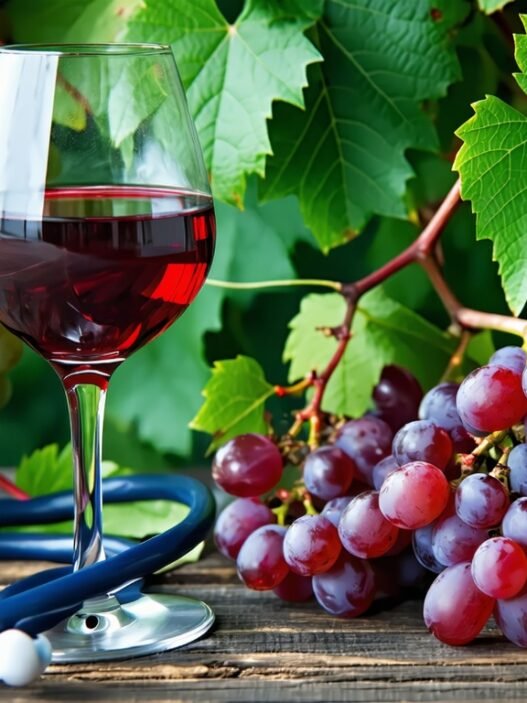Understanding Resveratrol
Overview of Resveratrol
Resveratrol is a natural compound that belongs to the polyphenol class of antioxidants. It was first isolated in 1940 from white hellebore roots and later from Polygonum cuspidatum roots in 1963. Resveratrol is present in over 70 plant species, with notable concentrations found in red wines, grapes, and various human foods. The abundance of resveratrol in grapes, specifically from Vitis vinifera, is believed to be a plant’s response to fungal infections, functioning as a phytoalexin that the plant synthesizes in reaction to injury or UV radiation (PMC).
Resveratrol is often highlighted for its potential health benefits, particularly regarding its role in energy enhancement and its anti-aging properties. This makes it an appealing topic for longevity and anti-aging enthusiasts.
Sources and Bioavailability
The bioavailability of resveratrol relates to how much of the substance reaches systemic circulation and can exert its effects. However, the bioavailability of resveratrol is notably limited due to its low solubility and rapid metabolism. Studies suggest that less than 70% of resveratrol is absorbed in the digestive tract, and it is quickly metabolized in the body, which can hinder its effectiveness (NCBI).
To enhance resveratrol’s bioavailability, novel formulations such as nanoformulations have been developed. These include solid lipid nanoparticles and nanostructured lipid carriers, which improve solubility and absorption rates compared to the raw form of resveratrol (PMC).
| Source | Resveratrol Content (mg/100g) |
|---|---|
| Red Wine | 0.2 – 5.0 |
| Grapes | 0.2 – 1.0 |
| Blueberries | 0.5 – 1.0 |
| Dark Chocolate | 0.1 – 0.3 |
While dietary sources can provide resveratrol, many individuals also consider taking resveratrol supplements to ensure adequate intake, especially for those focused on longevity and anti-aging benefits. The potential of resveratrol to serve as a powerful antioxidant beckons further interest, making its study integral to understanding health benefits associated with aging.
For a deeper understanding of its impact on health, including the various benefits it can provide, explore our articles on resveratrol benefits and resveratrol health benefits.
Health Benefits of Resveratrol
Resveratrol, a natural compound found in various plants, has gained attention for its potential health benefits. This section explores the anti-inflammatory effects, antioxidant properties, and cardiovascular benefits of resveratrol.
Anti-Inflammatory Effects
Resveratrol demonstrates significant anti-inflammatory properties, making it a promising remedy for conditions like arthritis and skin inflammation. Research indicates that resveratrol can modulate inflammatory factors, thereby reducing chronic inflammation in the body. This effect can help alleviate pain and swelling associated with joint issues, making it beneficial for older adults seeking relief from arthritis symptoms. A detailed exploration of these attributes can be found in our article on resveratrol for inflammation.
Antioxidant Properties
One of the standout aspects of resveratrol is its antioxidant capacity. Antioxidants help neutralize free radicals, which can damage cells and contribute to aging and chronic diseases. Resveratrol’s antioxidant properties enable it to scavenge these harmful molecules, thereby supporting overall health. This protective action contributes to resveratrol’s reputation as an anti-aging compound (PubMed Central). For a comprehensive understanding of its benefits, visit our section on resveratrol health benefits.
Cardiovascular Benefits
Resveratrol is particularly notable for its protective effects on cardiovascular health. Studies reveal that it can lower “bad” cholesterol (LDL), reduce inflammation within the cardiovascular system, and decrease the likelihood of clot formation that could lead to heart attacks. Furthermore, resveratrol has shown promise in improving serum lipid and glucose levels in individuals with Type 2 diabetes, highlighting its multifunctional role in promoting heart health and managing metabolic conditions (WebMD). For more information on heart-related benefits, explore our article on resveratrol for heart health.
In summary, resveratrol presents various health benefits, particularly in anti-inflammation, antioxidation, and cardiovascular protection, making it an essential compound for those interested in longevity and anti-aging.
Resveratrol and Disease Prevention
Resveratrol, a natural compound found in various plants, is gaining attention for its potential role in disease prevention. This section will explore its impact on cancer cells, diabetes management, and renal and liver health.
Impact on Cancer Cells
Resveratrol has shown significant promise in inhibiting cancer cell growth and progression. Research indicates that this compound exhibits both cytostatic and antiestrogenic properties, particularly with human endometrial adenocarcinoma cells (Anticancer Research). Additionally, studies have demonstrated that resveratrol can negatively affect cancer at all stages of development. It inhibits cancer cell growth, modulates cell signaling pathways, alters angiogenesis, and promotes apoptosis (programmed cell death) in various cancers (WebMD).
| Cancer Type | Resveratrol Effects |
|---|---|
| Endometrial | Inhibits growth and promotes cell death |
| Breast | Acts as an antiestrogenic agent |
| Colorectal | Reduces cell proliferation |
Diabetes Management
Resveratrol may also play a beneficial role in managing diabetes. Studies suggest that it can help improve insulin sensitivity and resistance, which is critical for maintaining healthy blood sugar levels. Furthermore, resveratrol supplementation has been associated with improved lipid profiles, showing promise in alleviating symptoms related to metabolic syndrome and aiding in diabetes management (Nutr Res).
The connection between resveratrol and diabetes highlights its potential benefits for individuals seeking to enhance their metabolic health.
| Parameter | Change with Resveratrol |
|---|---|
| Insulin Sensitivity | Improved |
| Blood Glucose Levels | Reduced |
| Lipid Profile | Enhanced |
Renal and Liver Health
Emerging research indicates that resveratrol also supports both renal and liver health. It has been shown to enhance renal function in the general adult population, suggesting potential benefits for kidney health (Nutr Res). In addition, resveratrol supplementation can improve liver enzymes and lipid profiles in patients with metabolic disorders.
This multifaceted approach to cellular health and regeneration points to resveratrol as a valuable compound for promoting overall wellness.
| Organ Health | Resveratrol Effects |
|---|---|
| Kidney | Enhances renal function |
| Liver | Improves liver enzymes |
The potential of resveratrol in disease prevention extends across various health domains, making it a compound of interest for those focused on longevity and anti-aging. For more information on the health benefits of resveratrol, explore our section on resveratrol benefits.
Resveratrol Supplementation
Supplementing with resveratrol can be an excellent way to harness its potential energy benefits, but it is essential to pay attention to dosage, potential side effects, and methods to enhance its bioavailability.
Dosage Considerations
Determining the appropriate dosage of resveratrol can be challenging. Most resveratrol supplements available in the U.S. contain extracts from the Asian plant Polygonum cuspidatum, red wine, or red grape extracts. Typically, these supplements offer dosages that range from 250 to 500 milligrams. Research indicates that higher doses, up to 2 grams (2,000 milligrams) per day, may be necessary for attaining the benefits observed in scientific studies (WebMD).
| Dosage Range | Effectiveness |
|---|---|
| 250 – 500 mg | Commonly found in supplements |
| Up to 2 g | Potentially required for effectiveness |
| Up to 5 g | Safe in clinical trials, but caution advised |
Potential Side Effects
While resveratrol is generally safe at levels found naturally in foods, supplementation can lead to side effects in sensitive individuals. Possible adverse reactions include gastrointestinal issues such as cramping, flatulence, and nausea, especially with high dosages exceeding 2.5 grams per day.
Individuals allergic to grapes or wine should exercise caution, as resveratrol may trigger allergic reactions. Furthermore, people with bleeding disorders or those on certain medications are advised to consult a healthcare provider prior to starting resveratrol supplements, as interactions may occur (WebMD).
Bioavailability Enhancement
The bioavailability of resveratrol can be a limiting factor in its effectiveness. Various methods to enhance absorption are being researched, including the use of nanoformulations such as nanoparticles, liposomes, and emulsions. These advanced delivery systems have shown promising potential in enhancing the therapeutic efficacy of resveratrol, particularly in targeting cancer treatment.
Incorporating resveratrol-rich foods into the diet, such as grapes, berries, and red wine, can also maximize its benefits while minimizing adverse effects. For those interested in the health advantages of resveratrol, consider exploring our articles on resveratrol health benefits and resveratrol foods for more information.
Resveratrol Research Findings
Research on resveratrol has provided valuable insights into its potential benefits. This section will delve into studies on microorganisms, human clinical trials, and the notable French Paradox study.
Studies on Microorganisms
Resveratrol has demonstrated the capacity to inhibit the growth of various pathogenic microorganisms, including both Gram-positive and Gram-negative bacteria, as well as certain fungi. Notable pathogens affected by resveratrol include Candida albicans, Campylobacter species, Arcobacter species, Staphylococcus aureus, Pseudorabies virus, and rotavirus. The antimicrobial activity of resveratrol derivatives and nanoformulations suggests potential applications for food safety and health.
| Microorganism | Type | Effect of Resveratrol |
|---|---|---|
| Candida albicans | Fungus | Inhibition of growth |
| Staphylococcus aureus | Bacteria | Inhibition of growth |
| Pseudorabies virus | Virus | Inhibition of activity |
Human Clinical Trials
Human clinical trials involving resveratrol have produced mixed results. For instance, a study involving type 2 diabetic patients who supplemented with resveratrol for six months did not report significant effects on diabetes management. This highlights the variability in resveratrol’s impact on different individuals and conditions.
| Study Participants | Duration | Finding |
|---|---|---|
| Type 2 diabetic patients | 6 months | No significant effects observed |
The French Paradox Study
The origins of resveratrol research can be traced back to its first isolation in 1940 from white hellebore roots. Later, in 1963, resveratrol was isolated from Polygonum cuspidatum roots. It is abundantly present in over 70 plant species, particularly in red wines, which has led to discussions around the so-called “French Paradox.” This term describes the observation that despite a diet high in saturated fats, French populations experience lower incidences of coronary heart disease, possibly due to resveratrol consumption. Resveratrol serves as a phytoalexin in plants, synthesized in response to factors such as injury, UV radiation, and fungal attacks.
| Discovery Year | Source | Significance |
|---|---|---|
| 1940 | White hellebore roots | First isolation of resveratrol |
| 1963 | Polygonum cuspidatum roots | Expanded understanding of sources |
| Ongoing | Found in red wines and plants | Linked to French Paradox |
The research findings surrounding resveratrol continue to evolve, shedding light on its potential health benefits and implications for anti-aging and longevity enthusiasts. For additional insights into the health benefits of resveratrol, please explore our article on resveratrol health benefits.
Future of Resveratrol
Challenges in Commercial Use
The commercial use of resveratrol as a pharmaceutical drug encounters several hurdles. One significant challenge is its low bioavailability, which refers to the degree and rate at which resveratrol is absorbed into the bloodstream. Factors such as low solubility and rapid metabolism contribute to this issue. Studies indicate that less than 70% of resveratrol is absorbed in the digestive tract, and it is quickly metabolized through various routes, diminishing its effectiveness in vivo (NCBI). Additionally, interactions with transporters and plasma proteins further complicate its pharmacokinetics, affecting its availability for therapeutic use.
Optimal Dosage Considerations
Determining the optimal dosage of resveratrol to maximize health benefits without inducing toxicity is an ongoing area of research. Current studies suggest a need for further exploration regarding the long-term effects, in vivo adverse effects, and interactions with other therapies. The FDA does not regulate resveratrol supplements, complicating consumers’ ability to ascertain product quality and effectiveness. Experts recommend caution with resveratrol supplementation for anti-aging and disease prevention until more robust scientific evidence becomes available.
| Aspect | Recommendation |
|---|---|
| General Safety | Considered safe in food amounts |
| Supplement Caution | Not advised for children, pregnant, or breastfeeding women |
| Consultation | Recommended for those with bleeding disorders or on certain medications |
Potential Harmful Effects
When taken in amounts naturally found in foods, resveratrol is typically regarded as safe. Nonetheless, it may cause allergic reactions in individuals sensitive to grapes or wine. Moreover, those with bleeding disorders or individuals on certain medications are advised to consult healthcare providers before considering resveratrol supplementation, as it may interact with various drugs. The potential side effects and interactions should always be evaluated, given that resveratrol side effects can range from mild to severe, depending on individual health conditions and concurrent medications (WebMD).
The complexities surrounding the commercial use, dosage, and potential adverse effects of resveratrol underline the importance of caution and guidance in its use for health and longevity. For detailed insights on its health benefits, explore our article on resveratrol health benefits.





















